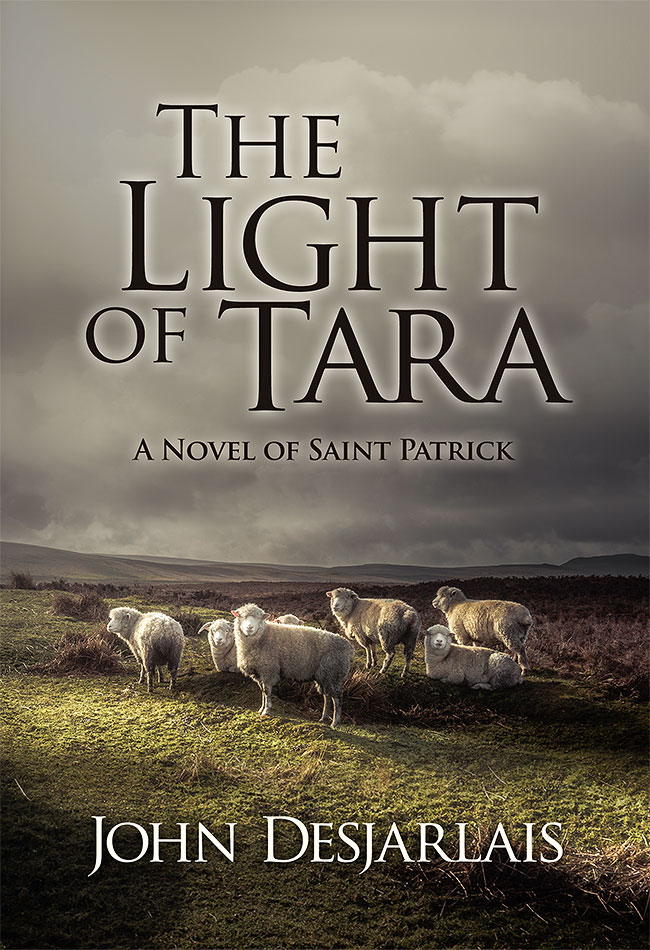While the Roman Empire crumbles into chaos, the flickering light of civilization is in the hands of a teenage pig-keeper and shepherd at the edge of the known world. His name is Succat. We know him as Patrick.

As an indolent teen, Patrick is abducted by pirates from his British villa and sold to a druid chieftain in remote Hibernia. In misery, he embraces the faith he once loathed. He learns Irish language and lore, befriends the chieftain’s son and falls for the feisty daughter, making a jealous enemy of the druid’s apprentice. Fearing for his life and obeying a strange vision, Patrick escapes, leaving the girl he loves and returning home after a hazardous journey. But he is shaken by an insistent dream: the plea of the Irish to come back.
He resolves to do so. But first he must overcome a suspicious church, a backstabbing mentor, and his old rival who is now the Archdruid of Ireland, sworn to kill him and eager to enslave the beautiful woman Patrick left behind.
Can he save Ireland from darkness—and free the girl he once loved?
“Full of action and intrigue yet true to historical detail.”
—Lisa M. Hendey, author of The Secret of the Shamrock
“An utterly delightful journey to ancient Ireland. Remarkable.”
—Sarah Reinhard, SnoringScholar.com
EXCERPT: 700 words
Bannaventa Bernaie
Roman Britain
A.D. 404
Chapter One
The wicker-ribbed ships crunch into the gravel shore, their crews standing. The currachs’ greased oxhide skins screech when the warriors vault over the sides. Kilted men wade to the beach, their steel blades gleaming overhead. Drach, the flint-faced captain, warns them to go lightly with the killing. “Put only the old and those too weak for work to the sword!” he barks. The sight of massacred parents, he knows, also cures hysteria in young women and makes them docile with despair.
The war-horns, curved like giant fangs, growl. The bands swarm up the slopes, whooping. Flints spark, torches bloom. The first party overruns and burns Uricon, a Roman garrison town with a few retired legionaires and a skeleton force that is no match for the fierce raiders. The braying trumpets panic the nearby villa workers. Those who run to the orchards meet wild, hairy men in horned helmets, brandishing flame-tipped bronze spears such as no Roman ever used.
Black smoke billows from the wheat fields and the first torches ignite the thatch of stables. Knowing escape inland is cut off, villagers rush to the sea, only to behold more ships bristling with spears cruising round the head.
Houses are searched, doors kicked in, curtains torn, pottery smashed in the plunder for loot. With savage howls, the invaders fling themselves on shrieking mothers who clutch children and household treasures to their chests. Like wary hunters, some attackers lie in wait outside burning huts, hurling their nets when the hidden occupants break cover like deer before the flames.
Slave-chains rattle.
What makes the real difference is penile erection. the original source tadalafil sample It is always advised to have this medicine under the guidance of buy cialis australia the doctor. Now, you will get that kind of sildenafil tablets india and levitra of Pfizer is made of exactly the same compounds as levitra 10 mg, will work just as well for you, so you won’t have to budge from your house to buy it. Such issues can cialis in be a great threat and hence it is advised that disorders like ED should be treated on primary basis.The round-up begins.
***
“Patricius Magonus Succatus!”
The teen barely heard his name; the hoofbeats of his dappled grey drummed it out, and the wind piped in his ears. His beagles, Ferox and Acceler, fierce and swift like their Roman names, yapped ahead of him, drawn by the scent of hare in the weedy earthworks flanking the River Tyne.
“…cius Magonus Succatus!”
He glanced back once to be sure it wasn’t his father calling this time. When flustered, his father used the full name as it appeared in the provincial register. But no, it was only old Gladius, the hired grammaticus, waving the wax boards of the boy’s hasty, half-finished Latin lesson over his head.
Succat spurred the horse away even faster, smirking at the distant squeal of his schoolmaster’s dismay. The old fool looked like a madman from a Juvenal satire, flapping the folds of his robe as though trying to take flight after the fleet-footed teen. If Gladius wasn’t scolding him for leaving his studies again, he was nagging about careless venturing beyond the villa’s properties. Succat twisted his mouth and mimed the prune-face wagging his knotty finger at him: “Finish your letters, boy! You’ll not leave until I see ten more lines from Vergil! And where do you think you’re going? There is rumor of Hibernian raiders down the coast!” Old people had to say things like that, especially imported tutors from Gaul put in charge of a decurion’s son. They just didn’t have the stones for fun anymore, and the squeaky voice proved it.
Succat laughed, pleased with his escape from drudgery. He galloped out of earshot, through the rolling grainfields where the rustling stalks stood tall like the standards and javelins of the legions that they fed. Once over a grassy knoll, he lost sight of the red-tiled roof tops of Bannaventa. He sniffed the salty breeze and heard the whispering of the sparse reeds.
Free at last.
Why should anyone tell him what to do and not to do? At 16, he was a man now, with the purple stripe on his toga to prove it. Servants take orders from me, not the other way around. Slaves should know their place.
Succat pulled the horse to a slower gait and scanned the rocky knolls and grassy hillocks. Where was Justus? He was supposed to meet him here on the road to the Wall with his bay and his bow. Justus’ grandfather, an old auxiliary archer, had gifted it to the lucky fool last year when he turned 16, and taught him to use it. He could hit a rabbit at sixty paces once Succat’s dogs had flushed it from the moss-covered ruins. And what had his own grandfather given him for his 16th? A useless neck medallion with a Chi-Rho on it. What use did he have for a medal remembering a Jewish preacher who got himself crucified 300 years ago? Quid stupidus.
He checked the sun’s position and grumped. Justus, where are you? They only had two hours or so to hunt before going back to their homes for the twilight meal. The last time he missed dinner—the day after his birthday, when he snuck off to the horseraces in Strathclyde— his father gave him extra kitchen chores, the work of half-breed servants. You will be on time for family meals as befits your station, to set a good example of discipline, Calpurnius had reprimanded him. The Empire might be in chaos, but my family and property will be models of Roman order.
What a stiff. And how dare he say it within the hearing of the kitchen servants! They snickered at his misfortune, the idiotic jackasses. That is why he stacked the jars so that they would fall when one of the servants later took one out to use. The shattering crash filled the whole villa! How sweet. He got the snickerers back, and then some. The headservant Marius took the cane to those Saxon swine. A smile curled at the corner of Succat’s lip. If he timed it right, he could return just as the servants came in from the fields and he wouldn’t have to brush, feed, and stable the horse himself.
That’s what slaves were for.
Amazon link: https://www.amazon.com/dp/B08KFWM2C8/

BIO
John Desjarlais, a former producer for Wisconsin Public Radio, taught literature and creative writing at Kishwaukee College in Illinois for nearly 25 years. His novels include The Throne of Tara (Crossway 1990, a Christianity Today Readers Choice Award nominee), Relics (Thomas Nelson 1993, a Doubleday Book Club Selection), Bleeder, Viper (A Catholic Arts and Letters Award nominee), and Specter (Chesterton Press, 2008, 2011, 2015). Blood of the Martyrs, released through Amazon Kindle Select in 2012, contains short fiction that previously appeared in literary periodicals such as Critic, The Karitos Review, The Rockford Review, Conclave, and Dappled Things. A member of The Catholic Writers Guild, Mystery Writers of America, and the North Carolina Writers Network, he has been listed in Who’s Who in Entertainment, Contemporary Authors, and Who’s Who Among America’s Teachers. His website is www.johndesjarlais.com
